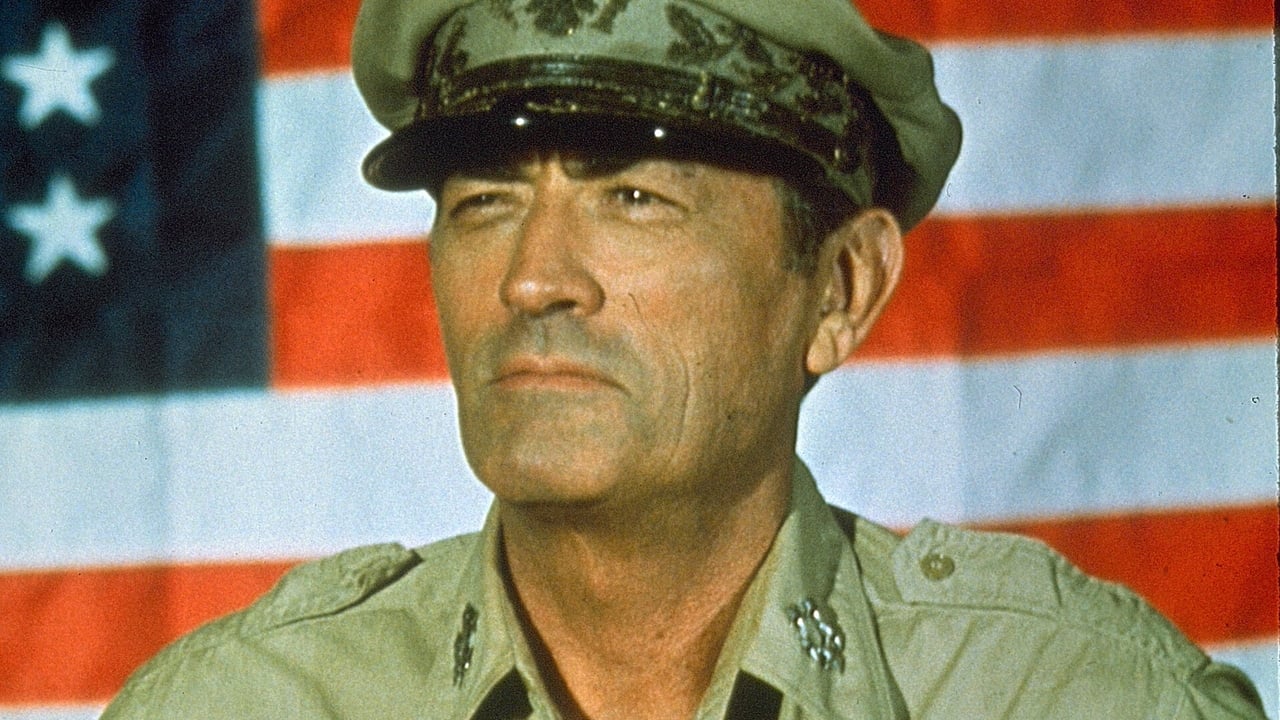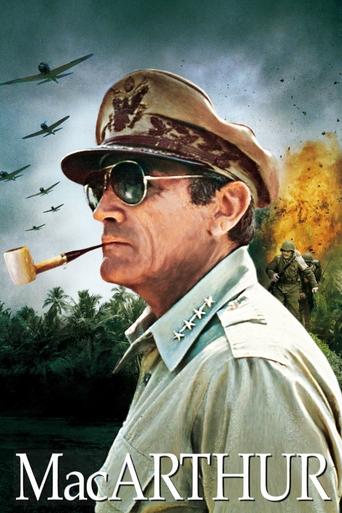

Sadly Over-hyped
... View Moredisgusting, overrated, pointless
... View MoreI wanted to like it more than I actually did... But much of the humor totally escaped me and I walked out only mildly impressed.
... View MoreThis movie tries so hard to be funny, yet it falls flat every time. Just another example of recycled ideas repackaged with women in an attempt to appeal to a certain audience.
... View MoreGeneral Douglas MacArthur (Gregory Peck) is giving a speech to the cadets at West Point in 1962. Then the movie flashes back to Corregidor in 1942 Phillipines. It follows him through the war into Korean and his forced retirement by President Truman.This is a very sincere old fashion Hollywood telling of a complex man. Gregory Peck plays him as a sensitive, commanding and resolute man with daddy issues. Historians can quibble about its accuracy but it seems to be very Peck-like. The production skimps on the budget and this is no Patton. The action is lacking and there is a lot of old footage used. They don't even use the right A-bomb footage. More troubling is the fact that the movie stops before he goes into politics. The "Old soldiers never die" speech and Eisenhower's nomination pretty much end the movie. That's the part where his name literally becomes an ism. This is strictly a beginner's guide to MacArthur probably good for a substitute teacher in high school history class to play.
... View MoreSince Douglas MacArthur affected more human livesfor the betterthan any other American not elected President, he deserved a better film biography. Not that Universal's "MacArthur" is bad. It's just not all it should have been.Oddly enough, the potential was there. From the very early "Star Trek" episode "The Corbomite Maneuver" (1966) to the recent HBO films "Something the Lord Made" (2OO4) and "Warm Springs" (2OO5), director Joseph Sargent has emerged as one of the most expressively human directors in film, a man capable of subtly shaping the emotional shadings of his actors' performances, and carrying the audience exactly where he wants them to go. The producer, Frank McCarthy, also gave us "Patton" (197O), the legendary Jerry Goldsmith scored both films, and Universal widely touted the fact that the film was "four years in preparation and production." Yet for all of this, "MacArthur" is perfectly adequateand not much more than that.The film begins in early 1942, shortly before the beleaguered general was orderedby President Franklin D. Roosevelt (Dan O'Herlihy)to flee the Philippines to avoid capture by the Japanese. Thus, this film omits: · MacArthur's birth in 188O in a frontier barracks in Arkansas still subject to attack by Native American tribesmenthus establishing that his remarkable life spanned the distance from bows-and-arrows to thermonuclear weapons; · his graduation from West Pointfirst in a class of 95, · how he joined his famous father, General Arthur MacArthur (who had earned the Medal of Honor at Missionary Ridge in the Civil War) on assignments in Japan, China and, most importantly, in the Philippines; · his heroic exploits in the 1914 excursion into Vera Cruz; · how he leaped about the trenches of World War One like a mountain goat, often wounded, and promoted with blinding speed to Brigadier General; · his postwar service as West Point's youngestand most progressivecommandant; · his participation in the court-martial of Billy Mitchell in 1924; · his routing of the Bonus Marchers in 1932; · his efforts to sustain a woefully-underfunded Army as Chief of Staff in the early 193O's; · his retirement from the U.S. Army to become Field Marshal (!) of the Army of the Philippines; · and the reactivation of his commission by FDR shortly before the outbreak of the Second World War.All this is omitted in favor of prolonged footage of MacArthur trying to fight off seasickness while being evacuated by PT boatthus, we know that "General Mac" is a legend, but not why; nor can we appreciate why the allegations of cowardice were so wounding to "Dugout Doug"and so patently unfounded.The remainder of his career is presently straightforwardly: His island-hopping "Hit 'em where they ain't" campaign, the fulfillment of his pledge to the Filipinos "I shall return!"his crowning achievement, the winning of the peace in postwar Japan, then the difference of opinion with President Harry Truman (a properly feisty Ed Flanders) over the conduct of the Korean conflict which resulted in his outright firing, and finally, his proclamation to Congress that "old soldiers simply fade away," after which he did just that. All quite historically accurate, and all presented with a very deliberate lack of commentary.Sargent and the producers almost painfully distance themselves from adorning the historical record with their own approval or disapproval: If MacArthur's actions appear noble, let them be presented as such; if they appear egotistical or bombastic, let those conceptions register sans comment. Since Joe Sargent is quite expert at subtly manipulating his audience's reactionsagain, see Warm Springsthis refusal to offer comment appears quite intentional. Historically, that may be commendable, but it almost defeats the efforts of the viewer to place this extraordinary man in any kind of rational perspective.And finally, there is a sort of "made on the cheap" feel to the film, as there is to "Midway," released about the same time. Both films were relegated to "television" directors--Sargent in this case, Jack Smight on "Midway," and both have a made-for-TV-look. Even Jerry Goldsmith's march, while perfectly serviceable, lack the subtle undertones and the grandeur of his "Patton" theme--just another way in which a larger-than-life man is memorialized by a very ordinary film.There was vanity and pettiness in this man, inarguably; there was also greatnessand love him or loathe him, one must acknowledge the fact that MacArthur did what no military commander before him had done: he won the peace.In the end, "MacArthur"like so many film biographiesis a good place to begin research into this remarkable man, but a poor place to end it.
... View MoreMacArthur is a great movie with a great story about a great man General Douglas MacArthur. This is of course, the story of one of America's great military figures, and a figure made familiar to me from the earliest moments of my memory. Though there is a continuity issue (there may be others) e.g. MacArthur's speech portrayed in the film as his 1962 address to the U.S. Military Academy on accepting the Thayer award did not contain the phrase "old soldiers never die; they just fade away." (That was in his speech to Congress upon his dismissal by President Truman) in 1951 for his alleged insubordination (these two did not see eye to eye!) Gregory Peck is im-Peck-able as the general who vowed he would return to the Philippines in World War II. The film moves quickly and easily with the General, his family and his staff from the beginning of the Second World War to the end of his service career. This film would be of much greater significance to one familiar with both WW II and the Korean War. Nevertheless, Peck's portrayal of this great man who fought the twin evils of fascism and communism and who hated war as only a soldier can is a memorable one indeed. "In war there is no substitute for victory."
... View MoreNo matter what you have to say about MacArthur, critical or otherwise, he shaped events in the Pacific theater of World War II to give him a part of history in the twentieth century. In this well done production with Gregory Peck in the leading role, he gives a candid performance of the flamboyant and publicity seeking authoritative General who turned earlier defeat into ultimate victory. His great speech on arrival from the Phillipines, by train at Spencer Street Station in Melbourne Australia in March 1942 incorporating those famous words - " I came through and I shall return" - was an inspiration to many Australians during their darkest hour.From the time of his arrival in our country he quickly abandoned the idea of defending any mainland invasion by the Japanese and decided on an offensive in New Guinea as a counter attack. Peck is perfect in the role of the self minded MacArthur doggedly pursuing the Japanese back to their homeland while arguing with his own superiors, including U.S. President Franklin D. Roosevelt over his earlier promise to liberate the Phillipines, which was planned to be bypassed. After the Japanese surrender, MacArthur becomes virtual ruler of Japan modifying old customs and instituting sweeping land reforms. His authority remained absolute until the outbreak of the Korean War in 1950, when he clashed with new U.S. President Harry Truman over his successful campaign against the North Koreans and his intention to take on their Communist Chinese backers. Truman, wanting to avoid another world conflict, relieves MacArthur of his command and he is recalled home. Peck is magnificent with his captivating speech before a band of West Point recruits where he details his life and closes the movie with that famous caption " Old soldiers never die - they just fade away". This movie is a must for the younger generation of this world, to know that today's freedom was the result of the sacrifices made by their forbears.To add a final footnote my mother worked at Archerfield aerodrome in Brisbane in 1942 with her sister where they were employed as aircraft riveter's being responsible for the repair of the fuselage of damaged U.S. Aircraft used during the defense of our country during World War 2. She told me well before her death in March 2004 how she took her limited time off from work to travel to central Brisbane just to watch General MacArthur walk down Queen Street from his home base at Lennons Hotel to the AMP building in Edward Street where he had his headquarters.She said what a fine figure he cut, tall and handsome, and full of confidence in his goal of supreme victory. Her expectations in the faith of this great American General were ultimately justified. We are a free country today for the contribution of his great military expertise in the time of our greatest need.
... View More